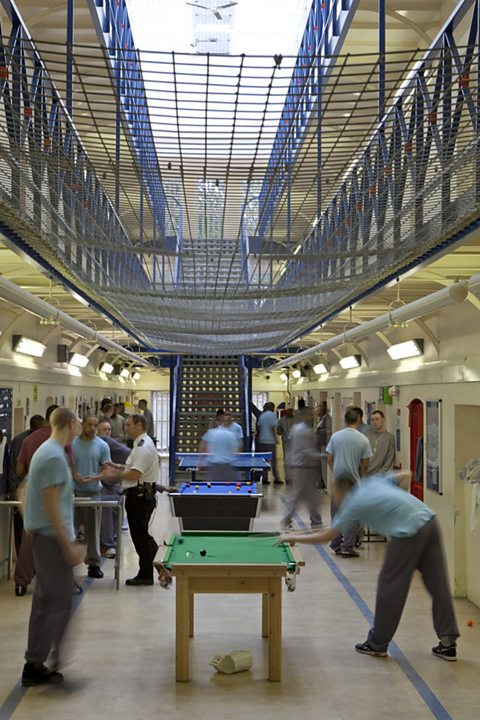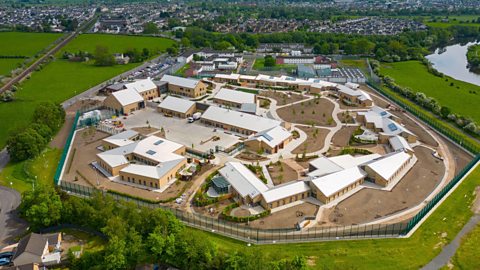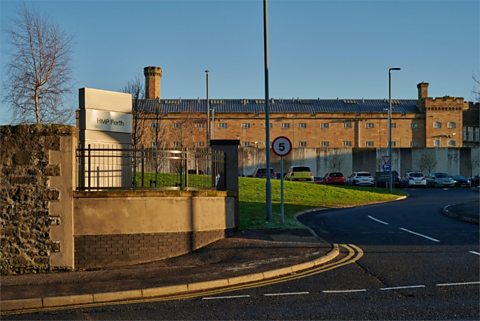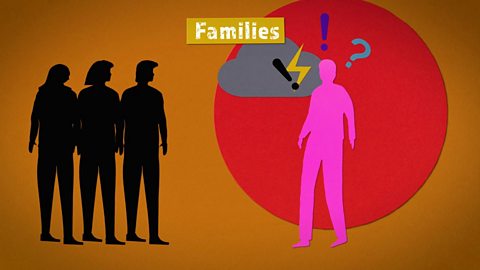Responses to crime - Prison
Quick version
Some of the Scottish Prison Service (SCP) aims are to:
- maintain secure custody of offenders
- focus on rehabilitation
- offer value for money for the taxpayer.
There are 16 prisons in Scotland:
- HMYOI Polmont is Scotland's Young Offenders Institution housing males aged 18-21
- HMP and YOI Stirling is Scotland's national women only prisons
- HMP Castle Huntly is Scotland only open prison
- HMP Addiewell is Scotland's only privately-owned prison
Scotland's prisons have low escape rates and reconviction rates have fallen.
However prisons are overcrowded, old buildings are ill-suited to the modern prison system, and suicide rates are higher than for most European countries.
Learn in more depth
The Scottish Prison Service (SPS)
The Scottish Prisons Service (SPS) has several aims including holding those serving a prison sentence securely in custody as well as looking to support offenders so they don’t re-offend on release.
Scottish Prison Service aims:
- to protect the public by maintaining secure custody
- to humanely care for offenders
- to reduce re-offending
- to offer value for money for the taxpayer
What types of prison are there in Scotland?
 Image source, Kay Roxby / Alamy
Image source, Kay Roxby / Alamy As of November 2024, there are 16 prisons in Scotland, but they do not all serve the same purpose:
- Prisons such as HMP Perth hold a mix of long and short-term adult male offenders, from those serving life sentences to those on remandTo be held in prison while awaiting trial
- HMYOI Polmont is a young offenders institute, for offenders aged 18 to 21 years
- There are YOIs at HMP Grampian, HMP Perth and HMP YOI Stirling
- HMP and YOI Stirling is Scotland’s women-only prison although there are also Community Custody units located in Glasgow and Dundee
- HMP Castle Huntly is Scotland’s only ‘open prison’ where low risk, long-term offenders complete the final part of their sentence
- Scotland’s newest prison HMP Addiewell is the only privately-operated prison
 Image source, Kay Roxby / Alamy
Image source, Kay Roxby / Alamy How are young offenders treated in Scotland?

Young people aged 18-21 years who are in custody are held in a Young Offenders Institution (YOI).
When a young male is sentenced to a period of imprisonment or is remanded by the court, they will generally be detained in Scotland's only male Young Offenders Institution at Polmont, near Falkirk.
- HMYOI Polmont is designed to hold up to 758 individuals
- in 2023, it held a maximum of 712 prisoners (Source: Polmont Prison) making it one of the biggest young offenders institutions (YOI) in the UK
- sentences given to prisoners at Polmont range from six months to life (before transfer to an adult prison) with the average sentence between two and four years
Young women sentenced to imprisonment or on remand will generally be held at HMP & YOI Stirling
Before September 2023, Scotland's young offender institutions held prisoners aged 16-21. Following suicides of young people while detained and the passage of a new law that bans children being sent to prison, the lower age limit was raised to 18.
Offenders aged under 18 are now held at one of four secure care centres in Scotland, each of which houses young people in groups of up to six.
The centres are overseen by the care inspectorate and run by care staff who work with the young people.

How are female prisons treated in Scotland?
 Image source, Iain Masterton / Alamy
Image source, Iain Masterton / AlamyIn June 2015, the Scottish Government announced that a change in Scotland's approach to dealing with female offenders, with a move towards custody in the community, backed by targeted support to address underlying issues and action to reduce the numbers of women receiving custodial sentences.
This reflects evidence that femaile prisoners are more likely than male prisoners to:
- be of lower risk to public safety
- be in prison for dishonesty offences
- have higher rates of mental health problems
- have drug problems
- have histories of physical and sexual abuse, and victimisation
- have dependent children
HMP and YOI Stirling
When a young female or adult female in Scotland receives a custodial sentence, or is remanded in custody by the court, she may be held within a separate facility for women in Scotland's national female establishment, HMP and YOI Stirling.
Opened in 2023, the £85m prison has been designed to take into account that most inmates will have experience of trauma. It also includes:
- a young offenders institute for females aged 18-21
- areas to support women in need of intensive mental health support
- a mother and baby centre
Community Custody Units
In addition, two new women’s Community Custody Units were opened in 2022:
- the Bella Centre in Dundee provides supported accommodation for up to 16 women and young people in three low supervision ‘shared houses’
- the Lilias Centre in Glasgow can accommodate up to 24 women in four shared houses.
The aim of CCU is to encourage independent living and coping skills which can be used when the women, many who have faced adversity and trauma, are ready to return to their own communities.
Despite moves to a more supportive approach to women prisoners, in August 2024, HM Inspectorate of Prisons for Scotland found that women were routinely strip-searched in checks for drugs, weapons and other banned material. The head of the inspectorate stated that this 'disproportionate and unnecessary' action was 'undermining the trauma-informed approach' recommended for working with women in prison.
 Image source, Iain Masterton / Alamy
Image source, Iain Masterton / AlamyChanges to Scottish prison life
 Image source, Quillpen royalty free stock / Alamy
Image source, Quillpen royalty free stock / AlamyHistorically, prisons were places where extreme forms of punishment were prevalent. Today's prisons are still very strict environments. Offenders have little privacy and no freedom. There are many restrictions on their lives.
However, today's prisons focus more on education and rehabilitation. Modern prisons allow outside visitors and encourage offenders to educate themselves. For example, there are creative writing classes and writers can come in to help offenders to develop their talents.
The hope is that, upon release, offenders will have the knowledge and skills to enable them to find work outside and therefore increase the chances of them not re-offending.
In 2019, the Presumption against short prison sentences (PASS) was extended from three months to 12 months. This means that the courts are encouraged but not forced to consider alternative punishments or disposals for offenders who may otherwise have been sentenced to a period of up to 12 months in prison.
 Image source, Quillpen royalty free stock / Alamy
Image source, Quillpen royalty free stock / AlamyEffectiveness of prisons
There is no one measure which can be used to decide whether prisons meet their aims. However, it could be argued that few prisoners escape, prisoners are generally well cared for and that overall, Scottish prisons provide value for money.
Reoffending and reconviction rates
Reoffending refers to a crime committed by someone already guilty of criminal activity. Reoffending includes reconvictions but also includes offending undetected by police. The Scottish Government’s preferred measure is reconviction.
According to the Scottish Government, in 2019/20, 24.1 per cent of offenders released from prison went on to reoffend, and were convicted, within a year of their release. This figure was better, on average, than some countries such as the USA (36%) but not as low as Norway which has only has a reconviction rate of around 20% in any given year.
While this figure is high, there has been a reduction in reconviction rates over the past 30 years.
There are many reasons to explain high rates of re-offending. These include:
- too many offenders are serving short sentences of less than 6 months. Most are returned to their community without having their problems, such as alcohol or drug addiction, addressed.
- Scottish prisons are overcrowded and there are not enough opportunities for offenders to take up meaningful employment or education
Quality of care
In June 2024, the Scottish Parliament's Public Audit Committee released a report that raised concerns about conditions in Scotland's prisons. The report outlined how lack of staff, overcrowding and the poor quality of aging buildings risked the human rights of prisoners with a number of prisoners forced to share cell, and prisoners being unable to attend medical appointments
In 2023, the Scottish Public Health Observatory reported that there was an average of 7,500 people in prison every day within an official prison capacity of 7725. (Source: Public Health Information for Scotland). This means that too often prisoners cannot get the support required to avoid reoffending on release.
A report from the Scottish Centre for Crime and Justice Research published in 2024 found that suicide and drug deaths in prison are increasing, and drug deaths are much higher in Scotland than in prisons in other places, including England and Wales, Australia and Europe.
Cost of prisons
Caring for offenders and subsequent reconviction costs the Scottish Government. In 2023-24, the Scottish Government allocated around £3.4bn for criminal justice. This is around 5.5% of the total Scottish Government budget. Of the £3.4bn or so, £540.8m will be spent on prisons.
Annually, the cost of keeping an offender in jail is over £44,620 per year.
In its 2023/4 report, Audit Scotland found that SPS has arrangements in place to ensure Best Value but faces a financially challenging position.
Quiz
Recap what you have learned
The Scottish Prison Service (SCP) aims to secure custody of offenders, focus on rehabilitation, and reduce reoffending.
There are 16 prisons in Scotland.
Prisons such as HMP Perth hold a mix of long and short-term adult male offenders.
Young offenders institutions HMYOI Polmont can hold up to 758 offenders aged 18-21.
Offenders aged 16 and 17 are now held at one of four secure care centres in Scotland, each of which houses young people in groups of up to six.
HMP and YOI Stirling is Scotland’s women only prison. It has a young offenders institute, areas for intensive mental health support and a mother and baby centre.
There are Community Custody Units for women located in Glasgow and Dundee. Their aim is to encourage independent living and coping skills which can be used when the women, are ready to return to their own communities.
HMP Castle Huntly is an open prison which offers less restrictive conditions for low-risk offenders nearing release.
In 2019/20, 24.1 per cent of offenders released from prison in Scotland, went on to reoffend, and were convicted, within a year of their release.
Reasons for high rates of re-offending include:
- Short sentences result in offenders returning to their community without addressing their problems, such as alcohol or drug addiction.
- Overcrowded prisons means, not enough opportunities for offenders to take up meaningful employment or education
In 2023, the Scottish Public Health Observatory reported that there was an average of 7,500 people in prison every day within an official prison capacity of 7725.
A 2024 report from the Scottish Centre for Crime and Justice Research, found that suicide and drug deaths in prison are increasing, with drug deaths are much higher in Scotland than in prisons in other places
As of 2022/23, the cost of keeping an offender in jail is over £44,620 per year.
More on Crime and the Law
Find out more by working through a topic
- count6 of 9

- count7 of 9

- count9 of 9
